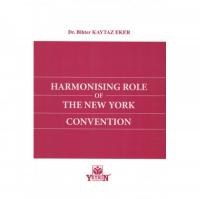Harmonising Role of The New York Convention
The United Nations Convention on the Recognition and Enforcement of Foreign Arbitral Awards (“the New York Convention”), signed on 10 June 1958, has provided a unique legal framework for the recognition and enforcement of foreign arbitral awards and arbitration agreements. Having been adopted by 166 States at the time of this book, the NYC represents the most significant convention in the field. Being widely adopted around the world more than any other international documents, it is time to assess its meaning for international arbitration. The NYC has played miscellaneous roles since its birth, and this book aims to address such an assessment within the context of its harmonising role. It provides a specific lens to offer a clear and comprehensive picture of harmonising role of the New York Convention and where future research should focus.
Having celebrated its 60th anniversary in 2018, this book, putting the role and significance of the NYC in the right context, would serve to pay tribute to the creators of the NYC on the one hand, and on the other hand would gain more attention than ever to direct effort to the right sources for further development in the field.
(Tanıtım Bülteninden)
TABLE OF CONTENTS
ACKNOWLEDGEMENTS 5
TABLE OF CONTENTS 7
INTRODUCTION 11
PART I: THE INTENDED EFFECT OF THE NEW YORK CONVENTION AT THE TIME OF ITS BIRTH
INTRODUCTION 16
CHAPTER 1: HARMONISATION TOOLS PRECEDING
THE NYC 17
Introduction 17
1.1. Circumstances Setting the Stage for the Geneva Protocol and the Geneva Convention 17
1.2. The Geneva Protocol and the Geneva Convention 23
1.3. Reactions to the Shortcomings of the Geneva Treaties 32
CHAPTER 2: THE OBJECTIVE AND IMPROVEMENTS OF
THE NEW YORK CONVENTION 41
Introduction 41
2.1. Scope of application 45
2.2. Arbitration Agreements 50
2.2.1. The Validity of Arbitration Agreements 51
2.2.2. The Effect of Arbitration Agreements 54
2.3. Arbitral Awards 59
2.3.1. Procedure 59
2.3.2. Formalities for applications for enforcement and
grounds for refusal 62
2.4. Relationship to other instruments 74
2.5. Other possible measures 76
CONCLUSION OF PART I 81
PART II: ACHIEVEMENTS AND LIMITATIONS OF
THE NEW YORK CONVENTION
INTRODUCTION 84
CHAPTER 3: ACHIEVEMENT OF THE ORIGINAL OBJECTIVE 85
Introduction 85
3.1. Harmonisation of Arbitration Concepts Regarding
Standards for Enforceability of Arbitration Agreements 96
3.1.1. Territorial scope of Article II 96
3.1.2. Harmonisation around the basic characteristics of
the New York Convention’s regime on
arbitration agreements 100
3.1.2.1. Presumptive validity of arbitration agreements 100
3.1.2.2. Exceptions 108
3.1.2.3. Obligation to refer parties to a valid
arbitration agreement to arbitration 114
3.2. Harmonisation of Arbitration Concepts Regarding the Recognition and Enforcement of Foreign Arbitral Awards 117
3.2.1. Scope of application 117
3.2.2. Harmonisation of enforcement of foreign arbitral awards under the regime of the New York Convention 126
3.2.2.1. Presumptive obligation to recognise
arbitral awards 127
3.2.2.1.1. Formalities under Article IV 127
3.2.2.1.2. Grounds for refusal 133
3.2.2.1.2.1. The term “binding” 139
3.2.2.1.2.2. The term “suspended” 144
3.2.2.1.2.3. The phrase “the competent authority of the country underthe law of which
the award was made” 147
3.2.2.1.2.4. Arbitral subject matters
and the public policy
defence 154
3.2.2.2. No affirmative obligation to deny enforcement 164
3.2.2.3. Procedure 181
CHAPTER 4: HARMONISATION OF LEGISLATIONS BEYOND THE INTENTION OF THE NEW YORK CONVENTION 184
Introduction 184
4.1. The Effect of the New York Convention on
the Model Law 186
4.1.1. Scope of Application 186
4.1.2. Relationship between Arbitration and Courts 188
4.1.2.1. Circumstances for court involvement
if the place of arbitration is in the country
of the court 190
4.1.2.2. Circumstances for court involvement
irrespective of where the place of arbitration is 195
4.1.3. The Conduct of Arbitration Proceedings 204
4.1.4. The 2006 Amendment 207
4.2. The Effect of the New York Convention on Legislative
Revisions in Model Law Countries 209
4.3. The Effect of the New York Convention on Legislative
Revisions in non-Model Law Countries 216
4.3.1. France 216
4.3.2. Switzerland 221
4.3.3. England 222
4.3.4. Sweden 230
CHAPTER 5: RELEVANCE OF THE NYC TO FURTHER HARMONISATION REGARDING ISSUES AFFECTING THE EFFICIENCY OF INTERNATIONAL ARBITRATION AND
THE CIRCULATION OF ARBITRAL AWARDS 231
Introduction 231
5.1. Limitations in Relation to the Scope of Application 231
5.2. Arbitration Agreement and Enforcement of Interim Measures 234
5.2.1. Reached limits with the launch of the UNCITRAL 235
5.2.2. The standard of review of arbitration agreements
in pre-award stage 236
5.3. A dilemma emerging with the trend of concluding
multi-tiered dispute resolution clause 245
5.4. Inadequacies of the Actual Execution System 252
5.5. Enforcement of Annulled Awards 257
5.5.1. Overview of approaches regarding the enforcement
of annulled arbitral awards 258
5.5.1.1. Germany 258
5.5.1.2. The Netherlands 260
5.5.1.3. United Kingdom 263
5.5.1.4. United States 264
5.5.1.5. France 271
5.5.1.6. Evaluations of approaches adopted by courts
in different jurisdictions 277
5.5.2. Is there a future role for the New York Convention? 281
5.6. Looking to the Future: What may be the Next? 283
5.6.1. Calls for a New Convention and Reactions 284
5.6.2. Some Suggestions for Further Harmonisation 291
CONCLUSION OF PART II 297
BIBLIOGRAPHY 303
Official Documents 303
Court Decisions 310
Legislations 353
Books and Articles 355
Electronic Sources 368
Annex 1: Convention on the Recognition and Enforcement of Foreign Arbitral Awards (The New York Convention) 371
Annex 2: The Geneva Convention on the Execution of Foreign
Arbitral Awards of 1927 379
Annex 3: The Geneva Protocol on Arbitration Clauses of 1923 384


